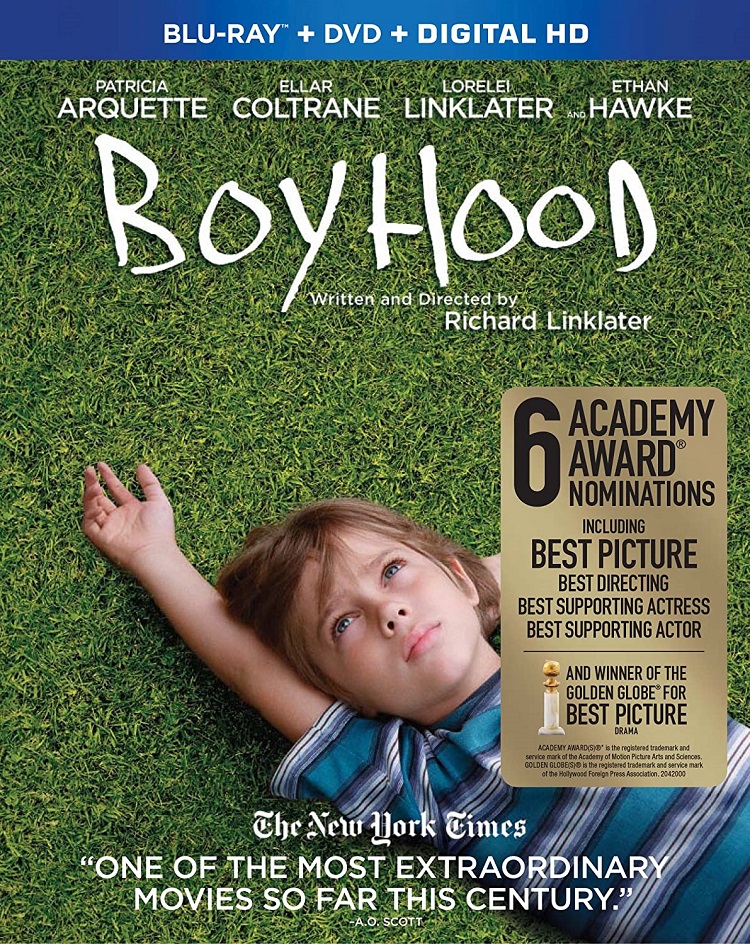
Boyhood is a paradox of a film, equal parts interesting and maddeningly mundane. It was made over the span of a dozen years by fearless writer/director Richard Linklater, who gathered the same key cast members at regular intervals to chronicle the childhood and teen years of Mason and his sister Samantha (Ellar Coltrane and Lorelei Linklater), along with the aging, gracefully and un-, of their parents, played by Ethan Hawke and an exceptionally good Patricia Arquette.
Unlike movies that are forced to use makeup (or CGI) to age-appropriate their actors, or that use younger look-alikes to show “Mason at 12” or “Mason at 16,” Linklater and company used the most powerful and mysterious force in the universe – time itself.
The film’s paradoxical nature comes from how easily the audience accepts the product of this unconventional production method. We note the aging of Mason, from wide-eyed, tow-headed six-year-old, to overwhelmed tween, to mildly rebellious teen on the cusp of what will hopefully be a creative adulthood, because we’ve seen it all before, in our own lives and in the lives of our kids, siblings, and friends.
Boyhood mostly relies on the everyday, unguarded moments of these ordinary people’s lives, the things that most other movies skip over or simply glance at. It’s the kind of naturalism that’s rarely seen in fiction films, the kind that some of the best documentaries capture when their subjects forget that there’s a camera there and simply eat a bowl of cereal, talk on long car rides, unmercifully tease their siblings, or observe the weird three-in-the-morning life of an all-night diner.
There is drama, but even it will be familiar to anyone who has been through a divorce or been forced together into a blended family. As the story begins, Arquette’s Olivia is the struggling single mom of Mason and Samantha. She decides to move to Houston and return to school just as the children’s irresponsible but loving dad Mason Sr. (Hawke) comes back into their lives. Despite the childish hopes of the kids, their parents don’t reunite; seeking stability, Arquette marries one of her professors (Marco Perella), who has two kids of his own but unfortunately turns out to be an abusive, alcoholic, my-way-or-the-highway bully. This is painful stuff to watch and Linklater is at his best in capturing the fear, hatred, frustration, and bewilderment that simple life choices can bring.
There’s more, lots more, as Mason Sr. stays on the periphery, never fully returning to the family’s life but not going away. Olivia moves into another relationship, bouncing from the older guy to a somewhat younger fellow student (Brad Hawkins) who, unfortunately, turns out to be nearly as much of a dick as the rage-aholic professor. Mason Sr. eventually settles down and remarries, becoming the responsible guy his first wife thought she wanted, but the story is really about Mason and to a lesser extent Samantha, as he grows older and also matures – two processes that don’t always happen in sync.
There’s a key scene when Mason learns his dad has sold the Toronado muscle car that was his aging, unreliable but cool set of wheels for so long. Hawke is bragging that he’s sold the car to a collector for five times what he had paid for it, trying to impart a little life lesson to his son, but Mason Jr., now just turned 16, only remembers that the dad had long ago promised that the car would one day be his. Hawke, of course, doesn’t even remember the promise, one of dozens that he, like millions of other guilty divorced dads, unthinkingly made. Like The Squid and the Whale, Boyhood captures the tiny nicks of divorce that can hurt worse than the more obvious scars.
These are among the strengths of Boyhood, flowing from the actors, the easygoing direction, and the helpfully era-defining soundtrack that takes us through the first decade of this century. Coltrane’s Mason is remarkably real, a quiet kid who is just a bit smarter than he seems. Watching him struggle with the triumphs and defeats of childhood, as well as the pain and bewilderment of being rejected by his first serious girlfriend, gave me a pleasant/unpleasant jolt of recognition.
His performance is even more impressive when, after the film is over, you realize that Coltrane (and the other actors) would have had no way of predicting precisely how the story would turn out. We the audience see the tied-together product of 12 years of intermittent work, but they lived through it without knowing precisely who they, and their characters, would become. That lack of foreknowledge is probably what makes the performances seem so real – the actors had to react as the kids and teens they were at the time.
The negatives of Boyhood are what you would expect: it’s long and, probably on purpose, kind of boring – like life. (I wrote “Will this movie ever end?” in my notebook about 10 minutes before it mercifully did reach the finish of its 164-minute running time.) Linklater is so focused on giving us a naturalistic slice of life that Boyhood can sometimes seem like an exceptionally well-shot set of home movies – or even outtakes from home movies, studiously avoiding anything too “dramatic.”
This casualness about story structure paradoxically makes the movie’s dramatic set pieces (such as a pep talk about responsibility to Mason from a teacher played by Tom McTigue) and its surprises (the re-appearance of a handyman played by Roland Ruiz, who took casual words of encouragement from Olivia and changed the course of his life for the better) seem even more out of place than they would in a more conventionally structured narrative. Even as we’re grateful for something more than just an artfully created flow of life itself, these can be jarring. Like I said, a paradox. Unique? Certainly. Worth your time? Possibly – and it does have a great soundtrack.